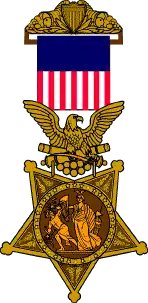William G. Austin
William Grafton Austin (January 6, 1868 – July 15, 1929) was an American enlisted man and officer in the U.S. Army who served with the 7th Cavalry Regiment during the Indian Wars. Austin received the Medal of Honor for extraordinary gallantry at the Battle of Wounded Knee, but now called the Wounded Knee Massacre, on December 29, 1890.[1][2]
William G. Austin | |
|---|---|
 | |
| Born | January 6, 1868 Galveston, Texas, United States |
| Died | July 15, 1929 (aged 61) Los Altos, California, United States |
| Place of burial | Cremated |
| Allegiance | United States of America |
| Service/ | United States Army |
| Years of service | 1887–1892, 1898 |
| Rank | Colonel |
| Unit | E Troop, 7th U.S. Cavalry |
| Commands held | 302nd Stevedore Regiment |
| Battles/wars | Indian Wars Spanish–American War |
| Awards | Medal of Honor |
Biography
William Grafton Austin was born on January 6, 1868 in Grimes County[3] or Galveston, Texas.[1] He enlisted in E Troop, 7th Cavalry Regiment of the U.S. Army in New York City on January 24, 1887; his age is recorded as 24 (birth year 1862 or 1863).[4][2] He fought in the Battle of Wounded Knee on December 29, 1890 and was awarded the Medal of Honor on June 17, 1891 for actions "while the Indians were concealed in a ravine, assisted men on the skirmish line, directing their fire, etc., and using every effort to dislodge the enemy".[1][2] He was discharged as a sergeant on January 23, 1892 at Fort Riley, Kansas.[4]
After his discharge from the military, Austin returned Savannah, Georgia where he was engaged in the Cotton business.[3] He joined the Savannah Volunteer Guards in 1894 and rose in rank from Private to Captain of Company A, which unit he commanded in the Spanish–American War as part of the Second Georgia Regiment of Volunteers.[3] Austin served as Chief of Police of Savannah and later owned and operated an automobile dealership.[3]
During World War I, Austin was appointed as commander of the 302nd Stevedore Regiment.[5] In 1919 Austin is listed as a Colonel in the Officers' Reserve Corps in the Quartermaster section in the State of California.[6] He later retired to Palo Alto, California where he died on July 15, 1929.[1]
Medal of Honor citation
Rank and organization: Sergeant, Company E, 7th U.S. Cavalry. Place and date: At Wounded Knee Creek, S. Dak., December 29, 1890. Entered service at: New York, N.Y. Birth: Galveston, Tex. Date of issue: June 27, 1891.
Citation:
While the Indians were concealed in a ravine, assisted men on the skirmish line, directing their fire, etc., and using every effort to dislodge the enemy.[7]
See also
References
- Army Times Publishing Company. "Military Times Hall of Valor: William Grafton Austin". Awards and Citations: Medal of Honor. MilitaryTimes.com.
- Art Leatherwood: William G. Austin from the Handbook of Texas Online (May 30, 2010). Retrieved June 23, 2010.
- Harden, William (1913). A History of Savannah and South Georgia, Volume 2. Chicago and New York: The Lewis Publishing Company. pp. 697–699. Retrieved June 18, 2017.
- "United States Registers of Enlistments in the U.S. Army, 1798-1914," database with images, FamilySearch (https://familysearch.org/ark:/61903/3:1:9392-6L12-C?cc=1880762&wc=M61R-1PF%3A176713301 : 22 May 2014), 084, 1885-1890, A-D > image 12 of 313; citing NARA microfilm publication M233 (Washington, D.C.: National Archives and Records Administration, n.d.), roll 44; FHL microfilm 1,319,377.
- "Assignments Given to Austin and O'Leary". The Atlanta Constitution. December 16, 1917. p. 15. Retrieved November 6, 2017 – via Newspapers.com.

- Official List of Officers of the Officers' Reserve Corps of the Army of the United States. Washington: United States Adjutant-General's Office. August 31, 1919. p. 12. Retrieved June 18, 2017.
- "Medal of Honor recipients". Indian War Campaigns. United States Army Center of Military History. June 8, 2009. Retrieved June 29, 2009.
Further reading
- Wilson, D. Ray. Terror on the Plains: A Clash of Cultures. Dundee, Illinois: Crossroads Communications, 1999. ISBN 0-916445-47-X
External links
- "William G. Austin". Find a Grave. Retrieved June 29, 2010.
